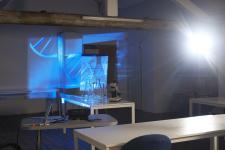Inside the garage labs of DIY gene hackers, whose hobby may terrify you
By Kristen V. Brown,
Fusion
| 03. 29. 2016
Untitled Document
When the future of genetic engineering arrived on Sebastian Cocioba’s doorstep, it was affixed to the back of a postcard from Austria with a little bit of packing tape.
Cocioba is a 25-year-old college dropout whose primary interest is tinkering with plant genetics in a lab he cobbled together from eBay. The lab is located in the spare bedroom of his parent’s lavish apartment in Long Island City, across the river from Manhattan. A few months ago, an internet friend from an online bio-hacking forum had sent him the lab’s latest addition: attached to that postcard was Crispr-Cas9.
Deposited onto a flimsy fragment of filter paper and wrapped in plastic, it looked like a tab of acid. But inside that crude packaging was the key to an incredibly precise DNA-editing technology that will revolutionize the world.
Crispr—a memorable acronym for the mouthful, “clustered regularly-interspaced short palindromic repeats”—gives scientists an unprecedented ability to decrypt and reorder genes, opening up a dazzling and terrifying universe of possibilities. This year, a top national security official called gene-editing a weapon of mass...
Related Articles
By Josie Ensor, The Times | 12.09.2025
A fertility start-up that promises to screen embryos to give would-be parents their “best baby” has come under fire for a “misuse of science”.
Nucleus Genomics describes its mission as “IVF for genetic optimisation”, offering advanced embryo testing that allows...
By Hannah Devlin, The Guardian | 12.06.2025
Couples undergoing IVF in the UK are exploiting an apparent legal loophole to rank their embryos based on genetic predictions of IQ, height and health, the Guardian has learned.
The controversial screening technique, which scores embryos based on their DNA...
By Vardit Ravitsky, The Hastings Center | 12.04.2025
Embryo testing is advancing fast—but how far is too far? How and where do we draw the line between preventing disease and selecting for “desirable” traits? What are the ethical implications for parents, children, clinicians, and society at large? These...
By Grace Won, KQED Forum [with CGS' Katie Hasson] | 12.02.2025
In the U.S., it’s illegal to edit genes in human embryos with the intention of creating a genetically engineered baby. But according to the Wall Street Journal, Bay Area startups are focused on just that. It wouldn’t be the first...




